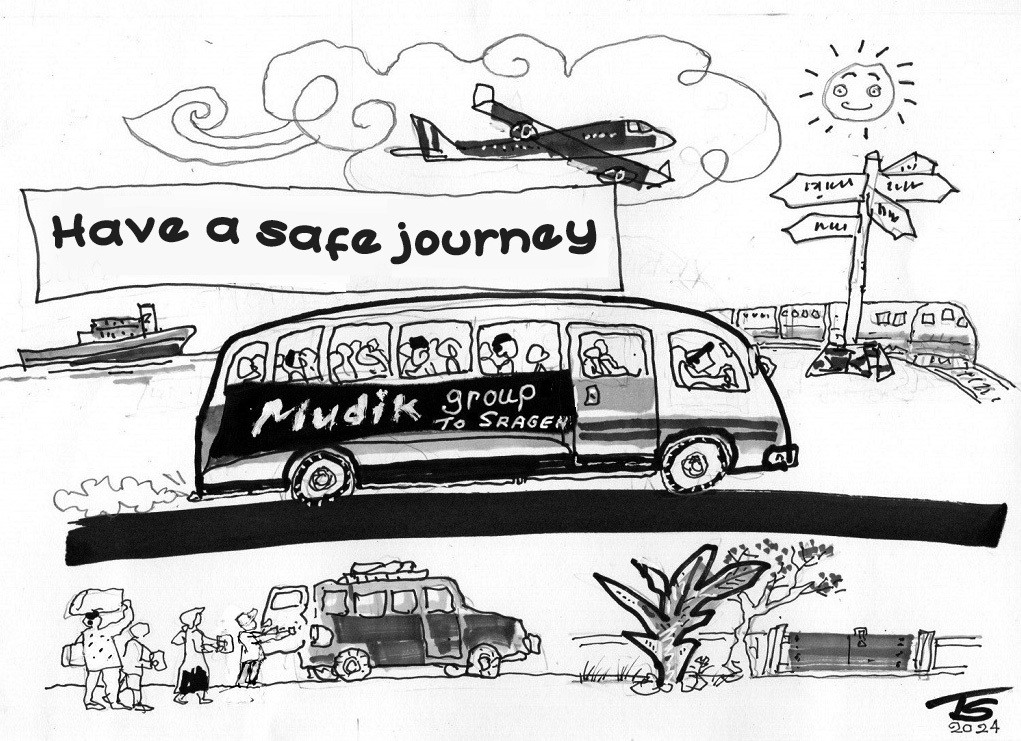Popular Reads
Top Results
Can't find what you're looking for?
View all search resultsPopular Reads
Top Results
Can't find what you're looking for?
View all search resultsSecuring ‘mudik’ against digital fraud together
Fake websites offering incredibly cheap tickets or travel packages for mudik or other large-scale promotions are commonly shared via WhatsApp chats or emails.
Change text size
Gift Premium Articles
to Anyone
I
t appears that this year will mark the largest mudik (exodus) in Indonesia's history. A survey by the Transportation Ministry projected that seven out of 10 Indonesians will return home or vacation during the 2024 mudik season.
This projection suggests a potential movement of 193.6 million individuals, representing approximately 71.7 percent of the country's population, a significant increase compared with the 2023 Lebaran season, which saw around 132-134 million people on the move.
The same survey revealed public transportation preferences among potential travelers, with trains as the most favored option for 39.32 million individuals (20.3 percent), followed by buses at 37.51 million (19.4 percent). This inclination is credited to the noticeable enhancements in the quality and quantity of transportation infrastructure throughout Indonesia.
According to an Indonesian Political Indicator survey, satisfaction with last year’s homecoming was significantly influenced by the state of public transportation.
In response to the growing demand for travel, online travel agents (OTAs) have facilitated ticket booking for homecoming trips since February. Transportation companies encourage prospective travelers to book tickets online to ensure a seamless journey.
Yet, within digital travel services' convenience lies a concealed menace: digital fraud. With the mudik season drawing near, the peril of succumbing to online scams looms larger for travelers.
Mudik has undeniably become an annual tradition with deep sentimental value for many. It is a time for migrants to come together with family and reconnect with relatives in their hometowns. However, this tradition has also allowed cybercriminals to exploit travelers through digital fraud. One prevalent scam involves fake ticket or travel package offers from fraudulent websites posing as legitimate travel agencies, online marketplaces or reputable transportation companies.
Fake websites offering incredibly cheap tickets or travel packages for mudik or other large-scale promotions are commonly shared via WhatsApp chats or emails. These false offers also frequently appear as advertisements or direct messages on social media platforms such as Instagram or Facebook. It is important to be cautious and verify the authenticity of the website and the offer before making any purchase.
In this scheme, scammers usually ask travelers to make specific payments for reasons like limited-time offers. Yet, once the payment is made, travelers never receive the promised tickets or packages, leaving them empty-handed and out of pocket.
Additionally, phishing is also a common digital scam. Scammers impersonate official channels like banks, OTAs, or other services potential travelers use through text messages or emails. They attempt to extract sensitive data like one-time passwords (OTPs) or passwords by posing as account-verification requests.
Once they acquire this information, scammers hack into the prospective traveler's account to steal personal data or conduct transactions pretending to be the victim. They can even modify login details, denying victims access and control over their accounts.
Phishing has become a growing threat to potential travelers, with scammers often impersonating government agencies or companies providing free mudik programs. In this scheme, scammers direct potential travelers to click on specific links or .apk files to steal victims' personal data, resembling the fake invitation scam.
The danger of fraud in preparing for the mudik journey cannot be underestimated. The Communications and Information Ministry notes that financial losses from online fraud in Indonesia amounted to Rp 18.7 trillion (US$1.2 billion) between 2017 and 2021. The Indonesian Internet Service Providers Association (APJII) predicts that online fraud and personal data theft will increase throughout 2024.
Therefore, we need to increase vigilance against potential scams. Prospective travelers should take several preventive measures to avoid falling victim to cybercrimes while busy planning their mudik journey.
One essential step is always searching for and purchasing tickets or travel packages from reputable transportation companies' or trusted travel agencies' official websites. Always double-check the validity of links before visiting them to avoid falling prey to various forms of digital fraud.
Moreover, do not hastily trust tempting offers from unverified sources. Scammers often use extravagant offers that appear too good to be true to entice prospective travelers, capitalizing on the tendency of individuals to seek the best deals when organizing their travels.
Furthermore, avoid clicking on links and downloading files from suspicious sources. Also, refrain from sending personal information via text or email to unknown parties.
However, despite the preventive measures we take, it is still possible to fall victim to cybercrime, such as data breaches beyond our control or unforeseen lapses. Therefore, it is essential to understand how to respond when falling victim to cybercrime.
The first step is to gather relevant evidence, such as notifications of account access changes or proof of transactions made without our consent. Then, the incident will be reported to appropriate parties, such as financial institutions, service providers and the police, providing the available evidence.
During Ramadan 2024, Traveloka noted a substantial rise in searches for train and bus tickets, with both categories experiencing increases of up to 30 times and 11 times, respectively, compared with the preceding month.
In addition to raising public awareness about digital fraud potential, the roles of other stakeholders, such as the government and industry players, are crucial in providing safe and comfortable travel services for consumers.
***
The writer is CEO of Transport at Traveloka.











